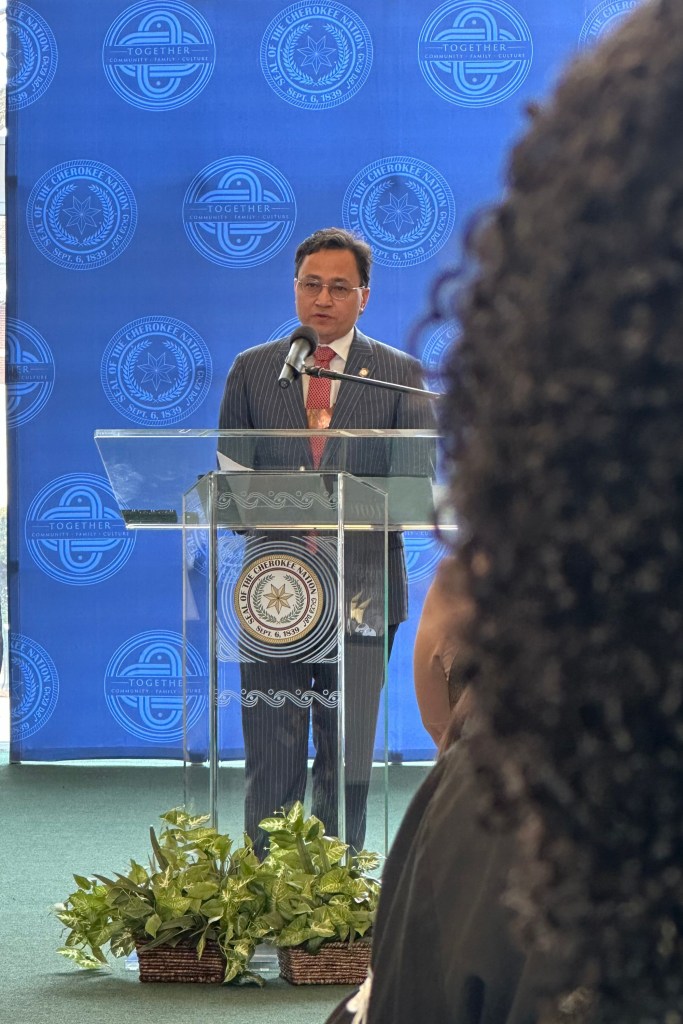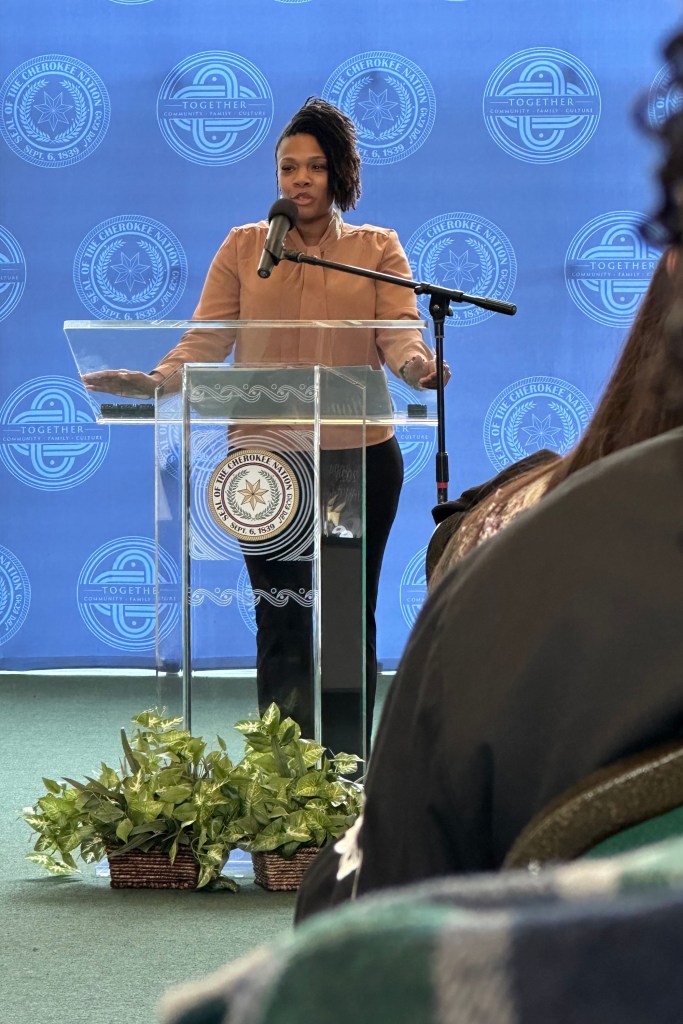|
Listen to this article here
Getting your Trinity Audio player ready...
|
GREENWOOD Dist.–Beneath the backdrop of Black History Month, Principal Chief Chuck Hoskin Jr. is pushing his people and the United States Congress to expand equal rights to descendants of Freedmen who were formerly enslaved by the Cherokee Nation.
Hundreds of tribal members and friends of the Cherokee Nation packed into Tulsa’s Greenwood Cultural Center Friday, Feb. 16 during a Black History Month celebration. Chief Hoskin Jr. signed three executive orders and proclamations aimed at correcting past injustices and creating a more united Cherokee Nation.
“I’ve offered an apology for the enslavement of Black people as chief of the Cherokee Nation, and I offer it to the descendants of Freedmen who are here today,” Principal Chief Hoskin Jr. said to a room full of applause.

Cherokee Nation builds bridges with Freedmen descendants
As the leader of one of the so-called Five Civilized Tribes (Cherokee, Chickasaw, Choctaw, Seminole and Muscogee [Creek]), only the Cherokee Nation has moved forward with providing full citizenship rights to its Freedmen descendants. The four other Indigenous nations, who also participated in slavery, continue to discriminate against Freedmen descendants either in whole or in part.
“No nation in the history of the world has ever truly atoned for its sins unless its willing to openly admit them,” Chief Hoskin Jr. said. Over 15,000 of the Cherokee Nation’s roughly 450,000 citizens are enrolled Freedmen.
In offering an apology, Chief Hoskin Jr. reiterated an acknowledgment of the nation’s brutal history, but he didn’t stop at words. Backed by members of his administration, which include Freedmen descendants in high-ranking positions, the Cherokee Nation Principal Chief signed three executive orders aimed at removing the final “badges of slavery.”
The orders include:
- Push Congress and the courts to recognize Cherokee Freedmen descendants as equal Cherokee citizens under the federal Major Crimes Act.
- Establish a task force to examine Freedmen descendants’ participation rates in benefit programs and release a report by Juneteenth 2024.
- Purchase a North Tulsa property to establish the first physical community space for the North Tulsa Cherokee Community Organization.
A “separate but unequal” system of justice
Since the U.S. Supreme Court reaffirmed the sovereignty of reservations in Eastern Oklahoma through the McGirt v. Oklahoma decision, the Five Tribes have pushed back against efforts by the state of Oklahoma to prosecute tribal citizens on tribal land.
Since the 2020 decision, Indigenous nations have beefed up their law enforcement and prosecutorial staff as most crimes committed by or against tribal citizens on tribal land go to tribal or federal courts, not state courts.

Meanwhile, the Major Crimes Act governs criminal jurisdiction of tribal citizens on tribal reservations. However, the 139-year-old law includes a requirement of “Indian blood,” which has led to a wide racial and political gap.
It means there are cases where Cherokee Nation citizens who trace their ancestry to formerly enslaved Freedmen are being tried in state courts with other non-tribal members.
“This is simply intolerable.”
“We are taking an inventory of these cases as we lobby to change this law and ensure all Cherokee citizens are treated equally as a matter of equality in the federal justice system,” Cherokee Nation General Chad Harsha said in a statement.
Chief Hoskin Jr. called out the blatant discrimination Friday as he signed an executive order seeking to change how the federal law recognizes Cherokee Freedmen. However, they’re not seeking to interfere with how the law is interpreted for other Indigenous nations.
“If a Cherokee citizen of Freedmen descent is accused of a crime, he can and will be hauled into state court. His status as a Cherokee Nation citizen will be completely ignored,” Chief Hoskin Jr. said. “Our message today is that this is simply intolerable.”
Related Stories
Task Force on Cherokee Nation Freedmen participation
A second executive order signed by Chief Hoskin Jr. Friday involved the formation of a task force to examine disparities among Freedmen descendants utilizing tribal services and benefits.
The Cherokee Nation leads the other Large Tribes in embracing their Freedmen kin, yet it wasn’t always the case.
The Five Tribes signed a series of treaties with the U.S. government in 1866 following their participation in the Civil War. Aside from preserving their reservation boundaries and sovereign governance, the treaties required the Tribes to free their enslaved people and grant them and their descendants full citizenship rights forever.

Nevertheless, it took a Supreme Court case in 2017 for the Cherokee Nation to fully admit Freedmen descendants back into the nation.
The task force, which is made up of Freedmen and non-Freedmen descendants, will produce a report on Juneteenth with recommendations for ensuring equal access to government resources, such as healthcare, education, housing and workforce training.
“We have to start with the position that locking out Freedmen descendants from citizenship for over a century was not just a moral stain, but it was an action that carried with it great practical consequences, which surely helps explain any low rates of access to programs and services here today,” Chief Hoskin Jr. said.
Freedmen descendants lead task force
Members of the task force include Cherokee Nation Secretary of State Shella Bowlin, Freedmen Community Advisor Melissa Payne, and Cherokee Nation Environmental Protection Commissioner Marilyn Vann. All three women are Freedmen descendants.
“This is a phenomenal moment,” Payne said ahead of the signing. “It’s one of the reasons I took the position I did, so that we could see our community, the Freedmen, be more involved. What Chief has done is he’s given us the opportunity to look at the data and see what we need to reach the communities.”

Related Stories
- Cherokee Nation Chief vs Oklahoma Governor: A look at leadership
- Muscogee Nation AG “intimidated” judge in Creek Freedmen trial
- Marilyn Vann: first Cherokee Freedman to hold gov. position in Tribe
Building community in North Tulsa
For his final act on Friday, Chief Hoskin Jr. signed a third executive order to signify the purchase of a building for the North Tulsa Cherokee Community Organization.
Three years after the organization formed in the majority-Black, Freedmen-rich community, dreams have turned into reality. The goal is to provide a community space for fellowship, meals, and a hub for Cherokee Nation citizens in the area.
“I want to thank the Cherokee Nation so much for having faith in us and helping us reach our desires for the community,” Waynetta Lawrie, President of North Tulsa Cherokee Community Organization aid.
“When we work together in the spirit of ‘gadugi,’ we find that it benefits us all,” Deputy Chief Bryan Warner said.
In a brief interview with the Black Wall Street Times after the ceremony, Chief Hoskin Jr. said the Cherokee Nation’s history and equality of Cherokee citizens of Freedmen descent may fuel discussion on all levels.
“I hope that there’s just an appreciation that we’ve been on a positive track because of this. And so if that influences the dialogue or the discussion elsewhere, I’m glad for that,” Chief Hoskin Jr. told the Black Wall Street Times.
Ultimately, Chief Hoskin Jr. said the obligation to his citizens and his obligation to his ancestors provide all the motivation he needs to continue seeking equal representation for Freedmen descendants. “That’s really what drives us. I think, incidentally, though, it surely helps spur some discussion in other tribal nations, and I think that’s positive,” he said.


